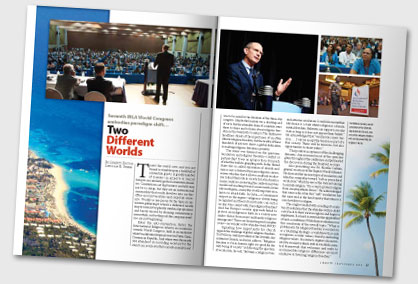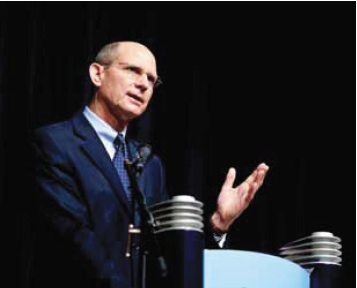Two Different Worlds
Lincoln E. Steed July/August 2012
Travel the world over and you are bound to stumble upon a hotel full of convention guests. A goodly number of travelers in airports at tourist hotspots are similarly garbed convention attendees. Conventions are big business and talk may not be so cheap, but they are an international commodity that easily devolves into on-the-office-account vacations and corporate souvenirs. Usually as one passes by the typical convention gathering it reveals a darkened, nearly empty room lit by ghostly overhead projections and barely stirred by droning commentary; meanwhile, out by the pool the company revelries are just beginning.
Enter the anti-convention. Enter the International Religious Liberty Association’s seventh World Congress, held at an exclusive white beachfronted tropical resort in Punta Cana, Dominican Republic. And where were the nearly 900 attendees? As recording secretary for the event I can assure you that scarcely an empty seat was to be seen for the duration of the three-day congress. Maybe the location was a drawing card of sorts, but the attendees from 65 countries were there to share and to learn about religious freedom in the twenty-first century. The daily news headlines shriek of the importance of an often illusive religious freedom, but the reality of these hundreds of activists shows a global dedication to making religious freedom a priority.
 Ted Wilson, world president of the Seventh-day Adventist Church, was one of the religious leaders who spoke powerfully for religious liberty.
Ted Wilson, world president of the Seventh-day Adventist Church, was one of the religious leaders who spoke powerfully for religious liberty.
The event was themed on the question: Secularism and religious freedom—conflict or partnership? It was an apropos focus for much of what the world is grappling with. In the United States the so-called separation of church and state is not so beloved by many religious conservatives who fear that it allows a militant secularism to limit their role in society. In Latin America many countries are leaving the confessional state model and reaching toward a more neutral state role in religion—many fear it will empower secularists to attack faith. In Cuba—a Communist outpost in the region—religion is slowly being recognized and freed of constraints: can such a secular state coexist with true religious freedom? And has Europe’s secular approach failed to protect an indigenous faith in a society now under threat from more militantly religious immigrants? These are fascinating and complex issues—no wonder so few attendees went AWOL!
Signaling how importantly his church regards the challenge of global religious freedom, Ted Wilson, world president of the Seventh-day Adventist Church, said in his address, “Religious freedom is a basic human right: it is good for the well-being of society.” Addressing the question of secularism, he said, “Between a religious state and extreme secularism I could choose neither. My choice is a state where religion is a fundamental freedom. Believers can support a secular state as long as it does not oppose their beliefs.” He acknowledged that “secularism causes tension. . . . I say we accept the tension as part of a free society. There will be tensions, but also opportunities to share values.”
That positive acceptance of the challenging dynamic characterized most of the speeches given throughout the conference and permeated the discussion during the breakout sessions.
Also presenting was Dr. Neville Callum, general secretary of the Baptist World Alliance. He dissected the various types of secularism and tilted his sympathy toward “soft or procedural secularism,” which he sees as the state not aiming to exclude religion. “It is a way to protect religion from unsympathetic forces.” He acknowledged that some critics fear this “soft” secularism has the same end as the hard variety that evinces a core hostility to religion.
The congress ended with a reading of a number of resolutions that the attendees will no doubt carry back to their various regions and begin to implement. It is hard to overstate the ripple effect of such a conference! With those resolutions was this conclusion of the overall topic: “What is problematic for religious freedom is secularism as a totalizing ideology: a worldview that only recognizes secular values, thereby excluding religious values. In contrast, regimes characterized by secularity which seek to establish a neutral framework that welcomes and seeks to accommodate religious differences are most conducive to fostering religious freedom.”
Article Author: Lincoln E. Steed
Lincoln E. Steed is the editor of Liberty magazine, a 200,000 circulation religious liberty journal which is distributed to political leaders, judiciary, lawyers and other thought leaders in North America. He is additionally the host of the weekly 3ABN television show "The Liberty Insider," and the radio program "Lifequest Liberty."